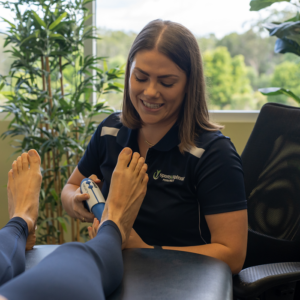
Foot health is a crucial aspect of overall well-being. Our feet bear the brunt of daily activities, from walking and running to standing for extended periods. Ignoring foot health can lead to various complications, affecting not just mobility but also overall quality of life.
Podiatry foot care involves specialised medical care aimed at diagnosing, treating, and preventing foot and ankle disorders. Podiatrists are trained professionals who address a wide range of foot issues, ensuring your feet remain healthy and functional.
Common Foot Problems and Their Impact
Several common foot problems can significantly affect your health and daily life. These include:
- Bunions: Misaligned bones causing a protruding bump on the big toe joint, leading to pain and difficulty in walking.
- Plantar Fasciitis: Inflammation of the plantar fascia, a thick band of tissue running across the bottom of your foot, causing heel pain.
- Ingrown Toenails: Nails that grow into the surrounding skin, causing pain, swelling, and potential infection.
- Corns and Calluses: Thickened skin areas caused by friction and pressure, often painful and unsightly.
- Heel Spurs: Bony growths on the heel bone, causing chronic pain, especially when standing or walking.
Foot problems can have a ripple effect on your overall health. Pain and discomfort in the feet can lead to altered gait, which can, in turn, cause knee, hip, and lower back pain. Chronic foot issues can limit mobility, reducing physical activity and contributing to weight gain and related health issues like diabetes and cardiovascular disease. Additionally, untreated foot problems can lead to infections and more severe complications, particularly in individuals with underlying conditions such as diabetes.
Ensuring regular podiatry care helps maintain foot health, allowing you to stay active, avoid pain, and prevent more serious health issues. Regular check-ups with a podiatrist can identify problems early, providing timely treatment and recommendations for proper foot care.
Benefits of Regular Podiatry Foot Care
- Early Detection and Prevention of Foot Disorders
Regular podiatry visits enable early detection and prevention of foot disorders. Podiatrists can identify signs of potential issues such as bunions, plantar fasciitis, and ingrown toenails before they become severe. Early intervention helps to address these problems promptly, preventing them from progressing and reducing the risk of complications. Preventive care includes advice on proper footwear, hygiene practices, and exercises to maintain foot health.
- Pain Management and Relief
One of the primary benefits of regular podiatry care is effective pain management and relief. Podiatrists can diagnose the underlying causes of foot pain and provide targeted treatments to alleviate discomfort. This may include orthotic devices, physical therapy, medications, or minor surgical procedures. By addressing pain at its source, podiatry care improves patients‘ quality of life and allows them to engage in daily activities without discomfort.
- Improved Mobility and Functionality
Regular podiatry care significantly enhances mobility and functionality. Podiatrists work to ensure that patients maintain proper foot alignment and function, which is essential for walking, running, and other physical activities. Customised treatment plans, including exercises and orthotic support, help improve foot mechanics and overall balance. Enhanced mobility not only facilitates an active lifestyle but also prevents further injuries and complications. - Enhanced Overall Health and Well-being
Good foot health is integral to overall well-being. Regular podiatry care contributes to enhanced overall health by promoting physical activity, reducing pain, and preventing complications associated with foot disorders. For individuals with chronic conditions like diabetes, regular podiatry visits are crucial for monitoring and preventing severe complications, such as infections or ulcers. Additionally, maintaining healthy feet positively impacts mental health by reducing anxiety and depression related to chronic pain and mobility issues.
Regular podiatry foot care offers numerous benefits, including early detection and prevention of foot disorders, effective pain management, improved mobility, and enhanced overall health and well-being. By prioritising foot health through consistent podiatry visits, individuals can enjoy a more active, comfortable, and healthy life.
Role of Podiatrists in Foot Care

Podiatrists are highly trained professionals with specialised knowledge in diagnosing and treating foot-related conditions. Their expertise ensures that patients receive accurate diagnoses and effective treatments tailored to their specific needs.
Podiatrists conduct thorough assessments to identify potential issues and underlying causes of foot problems. These evaluations help in creating a detailed understanding of the patient’s foot health, allowing for targeted and effective treatment strategies.
Based on comprehensive assessments, podiatrists develop individualised treatment plans that address the unique needs of each patient. These plans may include a combination of medical treatments, therapeutic exercises, and lifestyle recommendations to promote optimal foot health and prevent future issues.
Podiatry Treatments and Services
Podiatrists provide essential routine foot care services, such as trimming nails and removing calluses, to maintain foot hygiene and prevent minor issues from escalating into serious problems.
For specific foot conditions like plantar fasciitis, bunions, or flat feet, podiatrists offer tailored treatments, including custom orthotics and physical therapy. These treatments aim to alleviate pain, correct foot mechanics, and enhance overall foot function.
In severe cases where conservative treatments are insufficient, podiatrists may perform surgical interventions. These procedures address structural abnormalities, repair injuries, and provide long-term relief from chronic foot conditions.
Preventive Measures and Foot Care Tips
Wearing the right footwear is crucial for foot health. Proper shoes provide support, reduce strain, and prevent common issues like blisters, bunions, and heel pain. Select shoes that fit well, offer adequate arch support, and have cushioning for shock absorption.
Maintaining a daily foot care routine helps prevent infections and keeps feet healthy. This includes washing feet with soap and water, drying them thoroughly, especially between the toes, and moisturising to prevent dryness and cracking. Regularly inspect your feet for any changes or signs of problems.
Incorporating foot exercises into your routine can strengthen the muscles, improve flexibility, and reduce the risk of injuries. Simple exercises such as toe stretches, heel raises, and picking up objects with your toes can enhance foot health and overall stability.
Special Considerations for Diabetics and Elderly
Diabetics and elderly individuals face higher risks for foot complications such as neuropathy, poor circulation, and slow healing wounds. These conditions can lead to severe issues like ulcers and infections if not properly managed.
Frequent foot examinations by a podiatrist are essential for early detection of potential problems. Regular check-ups help monitor changes, address issues promptly, and prevent complications from escalating.
Diabetics and elderly patients require specialised foot care to manage their unique needs. This includes careful monitoring of foot health, personalised treatment plans, and guidance on proper foot care practices to maintain health and mobility.
How to Choose the Right Podiatrist

Selecting the right podiatrist is crucial for maintaining optimal foot health. Here are some factors to consider and questions to ask during your search.
Factors to Consider
- Qualifications and Certifications: Ensure the podiatrist is certified and has the necessary qualifications. Look for additional certifications in specialised areas of podiatry.
- Experience: Check how long the podiatrist has been practising, particularly in treating specific conditions you might have.
- Patient Reviews: Read reviews and testimonials from previous patients to gauge satisfaction and outcomes.
- Services Offered: Make sure the podiatrist offers a range of services that match your needs, from routine care to specialised treatments.
- Accessibility and Convenience: Consider the location and whether the podiatrist offers home visit services, which can be particularly beneficial for those with mobility issues.
Questions to Ask During Consultation
- What are your qualifications and areas of specialisation?
- How many years of experience do you have in podiatry?
- Can you provide references or patient testimonials?
- What treatment options do you offer for my specific condition?
- How do you stay updated with the latest advancements in podiatry?
- Do you offer home visit services, and how does that process work?
For personalised at-home podiatry services, choose Total Rehab Solutions. Our team of allied health specialists brings high-quality care directly to your door, ensuring convenience and comfort. Established in 2014, we pride ourselves on our collaborative, multidisciplinary approach to rehabilitation.
Enquire today by calling 1300 685 046 or filling out the form on our Contact page here. Let us help you embark on your journey towards improved foot health and greater independence.
